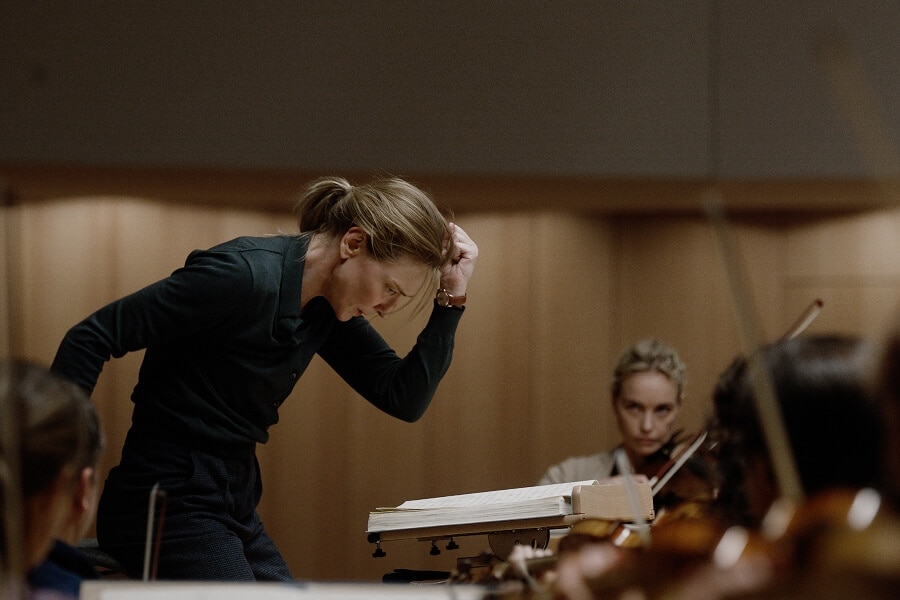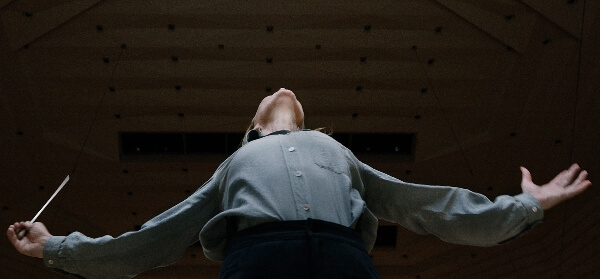Editor’s Note: The Austin NextTribe group saw this film on Thursday October 26th, the day the film was released nationally. The reaction from one NextTriber was, “What the actual F did we just watch?” We don’t want to give the plot away, but the final scenes were completely unexpected, at least to us!
***
Until I read a review after watching the film Tár, I thought it was based on a real person, as her character is so believable, so well drawn. Lydia Tár, as played by Cate Blanchett, is at the pinnacle of her career as the conductor of the Berlin Orchestra. In the opening scene, we see the maestro being interviewed live on stage by a staffer from The New Yorker. We hear the kudos about her remarkable work and witness her passionate explanations of the responsibilities and power of the conductor within the body of musicians who make up her orchestra. She is able to articulate to her audience the mysterious nuances of sound and performance.
She is a true maestro, confident, controlled, and brilliant. We follow Lydia through her days as she prepares for the recording that will take her career to the next level. We witness as she confidently interacts with her assistant, the conducting staff, the sound and recording crew. We see her personal relationships, intimate lunches with her aging, beloved mentor and confidant. And perhaps most telling, the domestic life with her partner and their beloved child. She is both imperious and humane.
Read More: True Summer Escapism: A Cinderella Story for Middle-Aged Women
The Color of Music
The film’s art direction is almost a character unto itself. Her spacious, ultra-modern Berlin apartment, all severe neutral colors and spare concrete walls, left me aching for some color. On her daily runs we see her in a gritty urban setting, old posters peeling off decaying walls.
But in the concert hall, we finally enjoy a bloom of warmth and color, with rich woods and sweeping architecture, the familiar, relaxed camaraderie of the musicians in their street clothes, chatting and warming up for rehearsal.
Despite Cate Blanchett’s ethereal beauty, she embodies the maestro with a very complex, masculine energy.
Lydia has bespoke clothing made to order. We see her tailor measuring, cutting and fitting her in suits that give her the gravitas her character is seeking. Despite Cate Blanchett’s ethereal beauty, she embodies the maestro with a very complex, masculine energy, confident and in control of all aspects of her life.
Director Todd Field slowly reveals the character’s sensitive side. In fact, Lydia Tár’s sense of hearing is so acute we find her disrupted in both her sleep and at the piano composing, by very faint, off-screen noises that she can’t tune out. In fact, she’s almost driven mad by them.
Monster? Victim?
Her many complex relationships are at the heart of this film. The power struggles within the community of musicians is something I had never considered. The subtle but knowing glances from the conductor to the first chair, observed quietly by the other senior members, are well played. Another telling scene shows Lydia Tár with her senior conducting students during a master class at Juilliard. Her teasing attempts at encouraging a nervous young student to find some inspiration from “old, dead white male composers,” such as Bach and her beloved Mahler, bring a generational and cultural gulf to light, setting the stage for her undoing.
She will make no compromises in capturing her desired sound.
Lydia Tár is neither a monster nor a victim, but an ambitious genius with a distinct goal—to make the conclusive recording of Mahler’s Fifth Symphony, capturing her own unique interpretation of it. She will make no compromises in capturing her desired sound and is ruthless while making personnel decisions that are hindering her goal. She is unable to rest until she brings this objective to fruition.
Despite the length of this film (three hours!) and its decidedly intellectual and talky early scenes, the film manages to make the complexities of the political and financial machinations of a top tier European cultural institution actually fascinating.
Chew On This
There are also a few “au courant” themes that will give audiences much to chew on:
I need to see the film a second time to catch all of the visual hints in order to understand the complicated plot twists.
- Relationships between mentor and student, the uneven balance of power in the workplace as well as personal relationships in the era of “Me too.”
- The power that social media has to take down the mighty.
- The struggle of having honest and open dialog despite conflicting schools of thought in the time of “cancel culture.”
- The sad reality is that whether or not you’re guilty or something …you will be tried in the courts of public opinion, especially in social media.
I need to see the film a second time to catch all of the visual hints in order to understand the complicated plot twists. There’s a mystery afoot that I haven’t quite unraveled. There are visual hints about her childhood that were revealed very subtly, but give her character a surprisingly rich backstory.
Many are predicting an Oscar nod to Cate Blanchett for the most complex character of her career. She displays seemingly native musical abilities and is able to effortlessly converse fluidly in multiple languages. Her eyes alone have such depth of emotion, displaying the inner torment of the mind of a genius who is watching their very carefully constructed life and career being torn apart with the whole world as her audience and witness.
Read More: Does it Get Any Better Than Watching Michelle Yeoh Kick Ass—Again?






















0 Comments